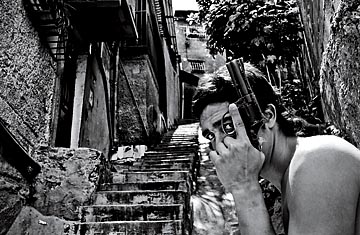
A gang member poses with a gun in Caracas. Some 50 homicides occur in the city each week.
There has never been a shortage of bereaved mothers in the sprawling, violent Caracas barrio known as Catia. But these days the sidewalks seem haunted by legions of women like Luz Marina Morón. In recent years, Morón has seen her brother-in-law, niece and 23-year-old son Roger murdered on Catia's streets — the latter shot in the face by a gangbanger who wanted Roger's New Balance tennis shoes. "Have you seen our homicide statistics?" Morón, 53, a nurse, asks me as we sit down for a guayoyo, a Venezuelan-style cup of coffee. "We might as well be in Syria."
Caracas on average suffers some 50 homicides a week (similar-size Los Angeles had just 12 per week in 2011), making it one of the world's deadliest capitals. As many as a third of them occur in Catia (pronounced Kaw-tee-a), where gunmen even use hillside garbage chutes to more efficiently dispose of corpses. Few of the killers — including Roger's, who was freed by police for lack of evidence despite eyewitness testimony of the crime — are ever prosecuted. That's not the way folks thought things would play out 13 years ago, when socialist President Hugo Chávez took power pledging to use the prodigious revenue from Venezuela's oil reserves — now the world's largest — to make long-neglected barrios like Catia not just sounder but safer. "The people around [Chávez] have to be hiding our reality from him. That's the only conclusion I can come to," says Morón. "Whatever it is, he won't get my vote." She adds, "Estoy harta" — I'm fed up.
On Oct. 7, Venezuela will hold its most important presidential election since 1998 — the year that Chávez, until then a failed coup leader, stunned his country's venal establishment and proved that the end of the Cold War didn't mean the demise of the Latin American left. Catia, whose cinder-block and corrugated-tin poverty is the first thing visitors to Caracas see en route from the airport, is considered the cradle of Chávez's support. But today its residents seem to crave answers more than ideology, and Chávez's "21st century socialism" has begun to evoke failed 20th century regimes like Fidel Castro's Cuba. Chávez's share of the vote in Catia has been shrinking, from over 70% in 2006, when the last presidential election was held, to less than 55% in the 2010 parliamentary elections.
If that trend continues in October, Chávez and his United Socialist Party could lose Catia to Henrique Capriles Radonski, Chávez's centrist challenger from the party Justice First. Capriles, 40, the governor of Miranda state — which adjoins Caracas — pledges a more Brazilian-style mix of pro-welfare and pro-business policies. Chávez could even lose the presidency itself if the barrio continues to be the electoral bellwether it's been since 1998.
Such an upset is still a long shot. Some polls show Chávez, 58, with a double-digit lead among voters, despite the cancer (whose type he won't disclose) that he's been battling since last year. Chávez opined recently on why he's ahead: "We have pulled Venezuela out of the corrupt swamp it was sunk in." His access to billions of petrodollars and a large state-run media machine hasn't hurt him either. But he still enjoys genuine and robust popularity in places like Catia, thanks to new health clinics and other improvements rendered by his Bolivarian revolution (named for 19th century South American independence hero Simón Bolívar). "Chávez," says Elio Uzcá tegui, who owns a paint store in Catia, "is still the only guarantee of social benefits we have here."
Yet almost a third of the electorate is undecided, and other credible polls indicate a much tighter race or even put Capriles ahead. Capriles' campaign rallies are drawing thousands even in Catia and other Chávez strongholds, especially as a spate of recent disasters — including an August explosion at a state-run oil refinery in western Venezuela that killed at least 42 people — casts more doubt on the revolution's competence. Although Chávez's health has softened his polarizing bluster somewhat, he insists that a win by his "majunche" (low-class loser rival) is "impossible." But many of his supporters are panicking, tossing rocks and torching a campaign vehicle at one recent Capriles event, while Chávez resorts to tactics like forcing television networks to interrupt broadcasts of Capriles' speeches so el Presidente can trumpet his socialist triumphs.
Chávez considers lifelong rule his messianic destiny. But Latin American caudillos with tighter grips on their countries than he has have lost elections in recent decades, often undone by the same ills that afflict Venezuela today. Not only has security collapsed — by some estimates, Venezuela's murder rate is four times what it was in 1998, and many political analysts say it could be the deciding factor in this election — but prison riots abound, spiraling inflation is devouring wages, food and hospital-supply shortages are common and power outages and infrastructure collapses seem routine. "Chávez's development model has failed," Capriles told me this year, noting that foreign investment has all but dried up in Venezuela. "I believe in his social programs, but to help the poor more effectively you also have to build economic capacity." Says marine engineer Saverio Vivas, 39, once a Catia leftist but now a Capriles campaign coordinator: "I used to take communism classes and read Sputnik magazine. But Chávez's revolution has taken my barrio for granted." As Venezuela's elite found out, that's not smart.
